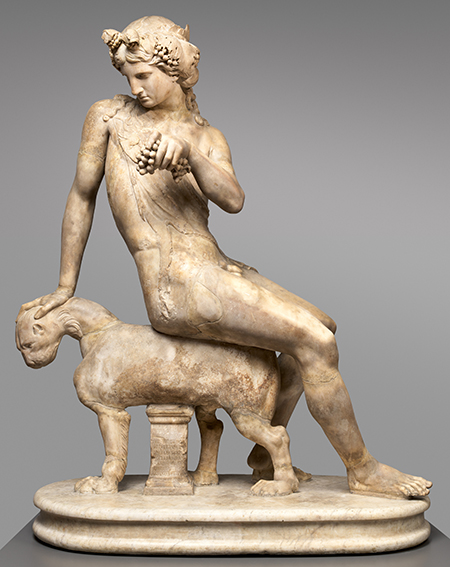 Over the last year, the exhibition ‘Dionysus: Portrait of a God’ at R D Milns Antiquities museum has been exploring the nature of one of the most enigmatic gods of the Greek pantheon, Dionysus. Artefacts from our own collection as well as objects borrowed from elsewhere have helped to tell the story of the worship of Dionysus in Greece and the many myths told about him. Through a series of events, games nights, and lectures, the museum has shown some of the many faces of this god. He was the patron of drama, an assistant in the afterlife, the bringer of wine, and the god of possession and delusion.
Over the last year, the exhibition ‘Dionysus: Portrait of a God’ at R D Milns Antiquities museum has been exploring the nature of one of the most enigmatic gods of the Greek pantheon, Dionysus. Artefacts from our own collection as well as objects borrowed from elsewhere have helped to tell the story of the worship of Dionysus in Greece and the many myths told about him. Through a series of events, games nights, and lectures, the museum has shown some of the many faces of this god. He was the patron of drama, an assistant in the afterlife, the bringer of wine, and the god of possession and delusion.
The exhibition closed in May with a lecture by Professor Alastair Blanshard on the topic of Dionysus as the catalyst for chaos and disorder. In Greek myth, wherever and whenever Dionysus turned up, he always overthrew the status quo. Kings and princes were humbled. Women were freed from domestic servitude and danced wildly and ecstatically in the streets. For a moment, mayhem reigned.
These myths resonated with their Greek audience because they allowed them to fantasise about the freedom, wildness, and transgressive possibilities that Dionysus brought. These myths exposed the fragility of so many of society’s rules and structures. They reminded rulers just how precarious their positions were. They taught you to cherish the life that you had because any moment it might be taken away. The myths of Dionysus heightened social anxieties, but they also reminded you that there was a cure for these problems. Dionysus brought disorder, but he also brought, with his wine and song, conviviality. In the egalitarian environment of shared drinking cups, it was possible – at least for a moment - to relax and escape the worries that best you.
The next exhibition at the R D Milns Antiquities Museum ‘Contested Histories: Photographs from Mandate Palestine in the JH Iliffe Collection’ opens on 26 July.
